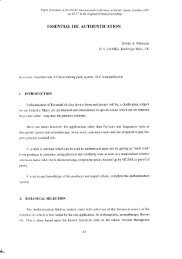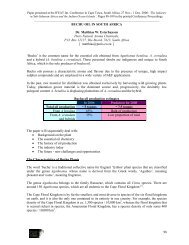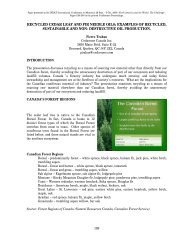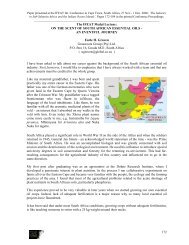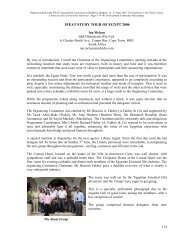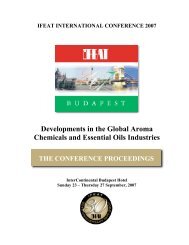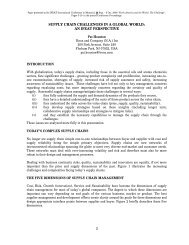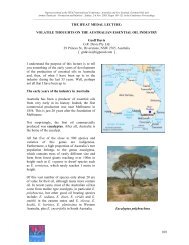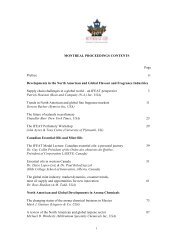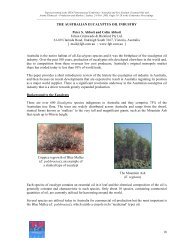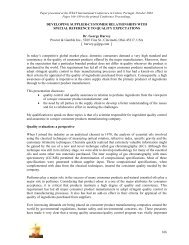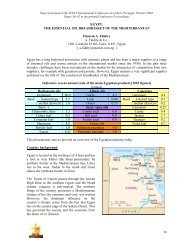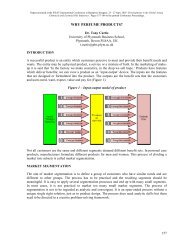Flavourist Training Course 2012 - IFEAT
Flavourist Training Course 2012 - IFEAT
Flavourist Training Course 2012 - IFEAT
Create successful ePaper yourself
Turn your PDF publications into a flip-book with our unique Google optimized e-Paper software.
Paper presented at the <strong>IFEAT</strong> International Conference in Singapore, 4 - 8 November <strong>2012</strong> ‘Essential Asia’Pages 291-294 in the printed Conference ProceedingsREPORT ON THE <strong>2012</strong>BRITISH SOCIETY OF FLAVOURISTS TRAINING COURSEAT THE UNIVERSITY OF READINGPresented by Charlotte Mills<strong>Flavourist</strong> <strong>Training</strong> <strong>Course</strong> <strong>2012</strong>96 delegates from 37 countries have participated since 2002As you are aware, <strong>IFEAT</strong> places a high priority on supporting education programmes within thisindustry. Besides giving financial assistance to support the Plymouth training courses, <strong>IFEAT</strong> alsosupports the annual course run by the British Society of <strong>Flavourist</strong>s (BSF) at the University ofReading’s School of Food and Nutritional Sciences in the UK.The first training course was held in 2002 and the programme has subsequently evolved into a threeweek intensive annual event with a well proven and successful formula. This year delegates attendedthe course from nine countries spanning across the world.The overall objectives of the course are:• To improve the training available to graduates, including M.Sc. and Ph.D. postgraduates, whowish to develop and apply flavourings for food and beverages• To emphasise the practical nature of flavour creation and its relationship to chemical structureand the biochemistry of foodstuffs• To use the combined expertise of Reading University and experienced BSF <strong>Flavourist</strong>s tobenefit the flavour and food industries.291
While lectures are given by the BSF expertsand University staff throughout the course,hands-on, practical and creative training is thecore element.The course commences with gaining practicalfamiliarity with the taste and smell of over100 natural and nature identical rawmaterials, plus the art of creative flavourings.The training ingredients include: herbs andspices, essential oils, extracts, isolates andoleoresins, natural defined chemicalsubstances, nature identical and artificialsubstances, process flavourings and smokeflavouringsIngredient training• Naturalo Herbs and spiceso Essential oilso Extracts, isolates and oleoresinso Natural defined• Flavouring substances• Process flavouringsThe course emphasises the development of individual creative flavouring skills.This involves practical ingredient training, thus:• Each ingredient is evaluated afterdilution in sugar syrup or salt solutionby the students• The emphasis is on practicalparticipation• Each ingredient is odour assessed andtasted by the students and ratedagainst selected organolepticparameters. The group rating wasplotted against a previous expertscore and the differences discussedby the group• 150 ingredients were assessed in 6working days.Practical ingredient training• During the first week 150 ingredients were assessed• Odour and flavour were discussed and individuallyrated for specific organoleptic properties• The groups ratings were collated and comparedagainst those of expertsThe course also emphasises practical creative training, in particular the emphasis is on individualcreativity.• Each student is given an initialbriefing on how to use the results ofthe ingredient evaluation in thecreation of flavourings.• Then working in pairs the studentscreate simple flavourings and thegroup then evaluates these.• As part of their final assessment, eachstudent then has to produce two finalcreations for evaluation, for example,yoghurt and alcoholic drink.Practical creative training• Emphasis was on individual creativity• Each student was shown how to usethe results of the ingredientevaluation in the creation offlavourings• As part of the final assessment, each student had toproduce two final creations for evaluation in differingmedia, e.g. Yoghurt or alcoholic drink• <strong>IFEAT</strong> award a prize for the best student292
As the course progresses, flavour creation exercises continue to more sophisticated levels. Thestudent’s knowledge base is extended through lectures and demonstrations of processes. The studentsvisit a flavour company specialising in the manufacture of essential oil and extracts, where differentextraction methods are demonstrated.Additional flavour topics covered include:• Flavour chemistry and biochemistry• Practical and theoretical flavouranalysis• Flavour legislation• Solvents, carriers, encapsulation andflavour release• Practical generation of modernprocess flavourings and their use incombination with herbs, spices andother food ingredients.Other topics• Flavour chemistry and biochemistry• Practical sessions on state-of-the artflavour analysis• Flavour legislation• Solvents, carriers, encapsulation and flavour release• Practical generation of modern process flavouringsand their application in combination with herbs, spicesand other food ingredientsEach of the trainees is required to demonstrate their flavour creations and to undertake a writtenexamination. All participants in the <strong>2012</strong> course were successful in obtaining diplomas.Participants seemed to thoroughly enjoy the course.So what happens to the trainees after they have successfully completed the course?The students have returned to their companies as much more accomplished flavourists and severalhave since been promoted. Several students from the previous courses are now Senior <strong>Flavourist</strong>s orTechnical Managers.293
The flavourist training course has clearly proveditself as beneficial to our industry. This has beenbrought about by effectively combining theresources of the British Society of <strong>Flavourist</strong>s, theUniversity of Reading and <strong>IFEAT</strong> and its members.Long may this continue.The next flavouring course is from 7-24 May 2013.11 th <strong>Flavourist</strong> <strong>Training</strong> <strong>Course</strong>...7 th - 24 th May 2013For information, please contact:Professor Don Mottramfood@reading.ac.uk ord.s.mottram@reading.ac.ukSome comments on <strong>2012</strong> <strong>Course</strong>• a pleasure ………… a good time and I haveimproved my knowledge soooo muchPaula Furlanetto - Brazil• a wonderful three weeks at the University of Reading.Selection and implementation of the lectures, friendlyrelations, pleasant environment, wine tasting, excellentdinner at Hinds Head ... It was just perfectAndrej Nose – SloveniaCharlotte Mills being awarded the Best Student Medal by Michael Boudjouk, <strong>IFEAT</strong> President294



